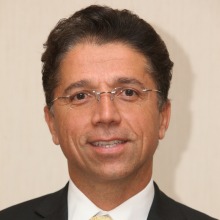
Bahram Jalali, PhD, is a pioneer of silicon photonics and a prolific inventor of record-setting imaging and sensing technologies and algorithms.
After earning his Ph.D. in Applied Physics from Columbia University in New York, Bahram began his career at Bell Laboratories, Physics Research Division, in Murray Hill, New Jersey. In 1993, he joined the faculty of UCLA's Electrical and Computer Engineering in Los Angeles. In 2022, he retired as a distinguished Professor Emeritus and Fang Lu Chair of Engineering while continuing as research professor.
Best known for his landmark advances in silicon photonics, including the first silicon optical amplifier and laser, Bahram’s laboratory has pioneered two qualitatively new approaches to imaging: the time stretch camera and the radio frequency fluorescent camera, methods that enable nonstop measurements at record speed without using an actual camera. These imaging technologies have opened up applications in cell biology and diagnostics and the discovery of ultrafast laser phenomena including Optical Rogue Waves and the observation of the birth of laser mode locking. He is the creator of PhyCV computer vision library that uses the equations of physics as blueprints for creating algorithms.
Bahram is a member of the National Academy of Engineering and the National Academy of Inventors. He is also a fellow of numerous professional societies spanning photonics, physics, and biomedical engineering. He holds 32 U.S patents and 11 foreign patents as of 2022 and has been recognized by the Scientific American Top 50 and MIT Technology Review Top 10, Optica’s R.W. Wood Prize, the IEEE’s Aaron Kressel Award, the IET Achievement Medal, and others.
His innovations have also led to three successful start-up companies including an imaging flow cytometry company acquired by BD Biosciences in 2017. He was the Founder and CEO of Cognet Microsystems, a Los Angeles based optical integrated circuits company that was acquired by Intel in 2001.
Bahram established this endowed chair to support faculty whose innovations and discoveries will further the global impact of optical technologies.
